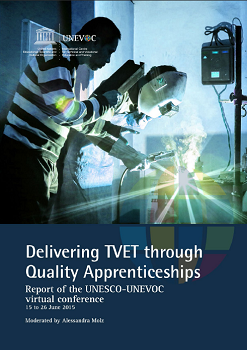
The UNESCO-UNEVOC International Centre: Who We Are | What We Do | Working With Us | Get in Touch
The UNEVOC Network: Learn About the Network | UNEVOC Network Directory
For Members: UNEVOC Centre Dashboard
Thematic Areas: Inclusion and Youth | Digital Transformation | Private Sector Engagement | SDGs and Greening TVET
Our Key Programmes & Projects: BILT: Bridging Innovation and Learning in TVET | Building TVET resilience | TVET Leadership Programme | WYSD: World Youth Skills Day
Past Activities: COVID-19 response | i-hubs project | TVET Global Forums | Virtual Conferences | YEM Knowledge Portal
Our Services & Resources: Publications | TVET Forum | TVET Country Profiles | TVETipedia Glossary | Innovative and Promising Practices | Toolkits for TVET Providers | Entrepreneurial Learning Guide
Events: Major TVET Events | UNEVOC Network News
 The virtual conference report on “Delivering TVET through Quality Apprenticeships” is now online.
The virtual conference report on “Delivering TVET through Quality Apprenticeships” is now online.
The two-week virtual conference took place from 15 to 26 June 2015 on UNESCO-UNEVOC’s e-forum and brought together 229 participants from 70 countries. The conference prompted participants to explore the characteristics of modern and formal quality apprenticeships, examine the challenges found in formal and informal apprenticeship systems, and analyse the conditions needed to promote quality apprenticeships. Importantly, the virtual conference took place at a time when today’s socio-economic climate, characterized by high levels of youth unemployment, compels stakeholders to introduce and improve apprenticeship schemes to expand the quality of TVET.
The virtual conference was moderated by Alessandra Molz, researcher in the area of workplace learning and skills development, in particular apprenticeship systems and social inclusion.
The report explores questions related to the definition of quality, innovations and alternative forms of apprenticeships as a form of work-based learning, financing and governance, and curriculum development. The report also stresses the importance of apprenticeships and recognizes that such forms of training entail multi-stakeholder systems that require adequate arrangements, consensus and commitment from a series of different actors and institutions. An important message is that apprenticeship systems operate within the wider context of a country’s cultural traditions, norms, socio-economic conditions and individual aspirations. Countries striving to set up, upgrade or improve an apprenticeships or other forms of work based learning need to be aware that arrangements should respect and be adapted to the individual characteristics of their country and society.